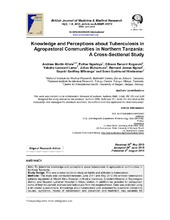| dc.contributor.author | Kilale, Andrew Martin | en_US |
| dc.contributor.author | Ngadaya, Esther | en_US |
| dc.contributor.author | Kagaruki, Gibson Benard | en_US |
| dc.contributor.author | Lema, Yakobo Leonard | en_US |
| dc.contributor.author | Muhumuza, Julius | en_US |
| dc.contributor.author | Ngowi, Bernard James | en_US |
| dc.contributor.author | Mfinanga, Sayoki Godfrey | en_US |
| dc.contributor.author | Hinderaker, Sven Gudmund | en_US |
| dc.date.accessioned | 2016-11-28T12:38:58Z | |
| dc.date.available | 2016-11-28T12:38:58Z | |
| dc.date.issued | 2015-08-04 | |
| dc.identifier.issn | 2231-0614 | |
| dc.identifier.uri | https://hdl.handle.net/1956/13134 | |
| dc.description.abstract | Aim: To determine knowledge and perceptions about tuberculosis in agropastoral communities in Northern Tanzania. Study Design: This was a cross sectional study on habits and attitudes to tuberculosis. Methods: The study was conducted between June 2011 and May 2012.We enrolled tuberculosis patients registered at Mount Meru Hospital in Arusha municipal, Enduleni Hospital in Ngorongoro district, and Haydom Lutheran Hospital in Mbulu district. In addition we selected for comparison some of their household relatives and individuals from the neighborhood. Data was collected using a structured questionnaire. Knowledge about tuberculosis was assessed by questions concerning causes, symptoms, modes of transmission and prevention and treatment. Key variables for assessment of perception on tuberculosis included: individuals considered most at risk, and misconceptions. Results: We recruited 164 respondents of whom 25% were confirmed tuberculosis patients, 41.5% relatives of the patients and 33.5% neighbors. Females constituted 48.8% of all respondents. Of all the participants, only two of the neighbors had never heard about tuberculosis in their life time. Even though 99% had heard about tuberculosis, specific knowledge on causes, prevention and treatment was poor. A total of 67.7% thought that transmission of tuberculosis occurs during sexual intercourse. Respondents thought that risk from tuberculosis was higher among adults (68.9%), alcohol users (39.6%), smoking (26.8%), consumption of raw animal products (6.1%) and childhood (23.2%). Conclusion: Our study shows that study participants had heard about tuberculosis but specific knowledge was low. Misconceptions surrounding causes, transmission, prevention and treatment of the disease were common. Selection of appropriate channels for public health education and awareness programmes targeting knowledge about prevention and control of tuberculosis in agropastoral communities may improve this situation. | en_US |
| dc.language.iso | eng | eng |
| dc.publisher | Sciencedomain | eng |
| dc.relation.ispartof | <a href="http://hdl.handle.net/1956/13135" target="_blank">Mycobacteria in northern Tanzania: Exposure and risk of disease among agropastoralists and programmatic challenges in investigation of re-treatment cases</a> | |
| dc.rights | Attribution CC BY | eng |
| dc.rights.uri | http://creativecommons.org/licenses/by/4.0 | eng |
| dc.subject | Knowledge | eng |
| dc.subject | perception | eng |
| dc.subject | Tuberculosis | eng |
| dc.subject | agropastoralists | eng |
| dc.subject | Tanzania | eng |
| dc.title | Knowledge and Perceptions about Tuberculosis in Agropastoral Communities in Northern Tanzania: A Cross-Sectional Study | en_US |
| dc.type | Peer reviewed | |
| dc.type | Journal article | |
| dc.description.version | publishedVersion | en_US |
| dc.rights.holder | Copyright 2015 The Authors | |
| dc.source.articlenumber | BJMMR.18973 | |
| dc.identifier.doi | https://doi.org/10.9734/bjmmr/2015/18973 | |
| dc.source.journal | British Journal of Medicine and Medical Research | |
| dc.source.40 | 10 | |
| dc.source.14 | 3 | |

